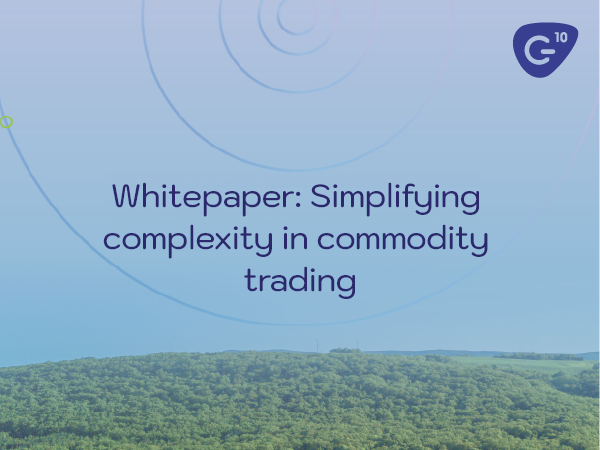With Energy Trading Week just days away, we are looking back to the discussions at the last event in this series 3 months ago and asking whether the industry is now better-able to solve the challenges it raised.
The last Energy Trading Week took place in June 2020, when, despite the spectre of further lockdowns and disruption from new waves of Covid-19, there was a sense of tentative optimism that businesses had overcome the worst of the initial challenge and that life may return to a “new normal”. Now, as areas across Europe and the USA again implement restrictions, we look forward to discussing how commodity businesses are set to meet the ongoing challenges of Covid in a rapidly evolving situation that calls for ongoing innovation.
The changing risk environment took centre stage across many panels and presentations at the June event as the pandemic exacerbated current risks and created new ones. Three months on, these risks remain. They were in the process of being addressed by the presenters and panellists at the time, but often called for ongoing improvement rather than a “once and done” solution.
Managing portfolios
With the need to manage portfolios more closely, the capabilities organisations require from their risk management solutions have also changed. As well as needing to understand global positions and MTM that can change rapidly with market disruptions (the negative crude oil price in April springs to mind), credit risk and counterparty risk also need to be managed closely and centrally, ensuring key data is always available to traders in a manner that is both timely and actionable.
Compliance risk has evolved in a similar way; it too was a known critical risk before the pandemic but has new aspects that may not have been considered previously. For example, remote working has created new challenges for trade monitoring as well as compliance issues such as data protection. With employees in a home environment, policies around device usage (eg whether traders can use personal phones and laptops) and cybersecurity need to be up to date and widely understood by employees.
Data is another risk that is growing in significance throughout the pandemic. Until recently, for all the focus on improving data access and systems, having strong data capabilities was thought of as a competitive advantage. Now the opposite is true: organisations that do not have the ability to store, transform and use their data are facing a serious risk.
Data risk is especially important during periods of volatility when situations can change rapidly and businesses need to make the right decision fast. As renewables and intraday trading continue to disrupt energy markets, this data risk can impact on energy and commodity traders by limiting the options they have available and their ability to make agile decisions. When traders need more creative strategies to generate an edge in every trade, the lack of relevant data can seriously harm their performance.
Operational risk
Operational risk has been an underappreciated risk factor for several years, albeit one that has seen growing awareness recently. Again, this risk has been exacerbated by the pandemic, for example by increasing the consequences of mistakes, but particularly in amplifying the challenge of managing information flows between teams.
It’s more important than ever for traders to have access to the most up-to-date risk reports, and when operators can’t simply turn around to speak to a trader, it’s crucial that information flows consistently and accurately between these teams without the need for constant conversation. One presenter at Energy Trading Week stated that streamlining the bill of lading, logistics and payments will have the biggest impact in future.
The good news is that this streamlined process is already possible. Not only does Gen10 commodity management software automate trading and operational workflows, sharing data between teams as standard, it also includes 2-way integrations that share data with accounting systems to update payment records across multiple systems instantly.
People risk
Remote working has introduced questions we have never considered before, such as how do you maintain your culture whilst people are working from home? As well as impacting on other risks such as ensuring people are following your culture of compliance, there are challenges surrounding the right level of communication and oversight for people to be effective; sharing the necessary information without wasting time in unnecessary meetings.
We recently explored how commodity management technology can help teams communicate more effectively and add more value to their interactions both internally and externally. Find out how commodity management software keeps people connected.
Infrastructure and cyber security
Infrastructure risk derives from the systems you are using and the controls you have over them, from WiFi networks to the hardware people use. When people are working from home, they have more opportunities to inadvertently cause increased infrastructure and security risks, by connecting to unsecure networks or saving company documents to a personal laptop.
With all of the above risks needing to be addressed, it is no surprise that 55% of respondents to one poll stated they were thinking of extending or adding functions to their legacy E/CTRM. This can mean that even if the organisation has already responded to the infrastructure risk of employees working from home, there is more to consider.
Policies and technology are needed to manage infrastructure risk and address cyber security, and when looking at software it’s important to work with vendors who can demonstrate their security credentials and show how they will keep your business secure.
At the most recent Energy Trading Week we discussed a wide range of risk factors exacerbated by the lockdowns that we were in the middle of. Three months on, the energy industry is more fortunate than some to be in a place where business is moving forward again. At Gen10, we have been involved in a range of digital transformation projects across different commodities this summer with organisations who understand that technology is fundamental in periods of disruption. For those who have identified issues with systems and processes but have not yet acted to make the necessary improvements, it is not too late to begin a digital transformation journey. But the last year has shown that transformation is essential to respond to the changing market and remain competitive with those who are updating their own systems in response.
Join us for the next Energy Trading Week to discuss what has changed in the energy industry in recent months, what is predicted to change in future and how you can best prepare your organisation for the next industry disruption.
Want to read more?
Subscribe now for monthly updates
By submitting your details you agree that we can store your data and communicate with you. You can opt out of these communications at any time. Read all in our Privacy Policy.



